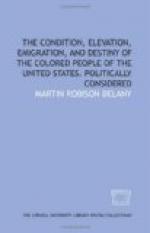Nor was Africa then, without the evidence of industry, as history will testify. All travelers who had penetrated towards the interior of the continent, have been surprised at the seeming state of civilization and evidences of industry among the inhabitants of that vast country. These facts were familiar to Europeans, who were continually trading on the coast of Africa, as it was then the most important part of adventure and research, known to the world. In later periods still, the history of African travelers, confirm all the former accounts concerning the industry of the people.
John and Richard Lander, two young English noblemen, in 1828, under the patronage of the English government, sailed to the western coast of Africa, on an expedition of research. In their voyage up the river Niger, their description of the scenes is extravagant. They represent the country on each side of the river, for several hundred miles up the valley, as being not only beautiful and picturesque, but the fields as in a high state of cultivation, clothed in the verdure of husbandry, waving before the gentle breezes, with the rich products of industry—maize, oats, rye, millet, and wheat, being among the fruits of cultivation. The fences were of various descriptions: hedge, wicker, some few pannel, and the old fashioned zig-zag, known as the “Virginia worm fence”—the hedge and worm fence being the most common. Their cattle were fine and in good order, looking in every particular, except perhaps in size, as well as European cattle on the best managed farms. The fruit groves were delightful to the eye of the beholder. Every variety common to the country, were there to be seen in a high state of cultivation. Their roads and public highways were in good condition, and well laid out, as by the direction of skillful supervising surveyors. The villages, towns, and cities, many of them, being a credit to the people. Their cities were well laid out, and presented evidence of educated minds and mechanical ingenuity. In many of the workshops in which they went, they found skillful workmen, in iron, copper, brass, steel, and gold; and their implements of husbandry and war, were as well manufactured by African sons of toil, as any in the English manufactories, save that they had not quite so fine a finish, garnish and embellishment. This is a description, given of the industry and adaptedness of the people of Africa, to labor and toil of every kind. As it was very evident, that where there were manufactories of various metals, the people must of necessity be inured to mining operations, so it was also very evident, that this people must be a very hardy and enduring people.
In 1442, fifty years previous to the sailing of Columbus in search of a new world, Anthony Gonzales, Portuguese, took from the gold coast of Guinea, ten Africans and a quantity of gold dust, which he carried back to Lisbon with him. These Africans were set immediately to work in the gardens of the emperor, which so pleased his queen, that the number were much augmented, all of whom were found to be skillful and industrious in agriculture.




